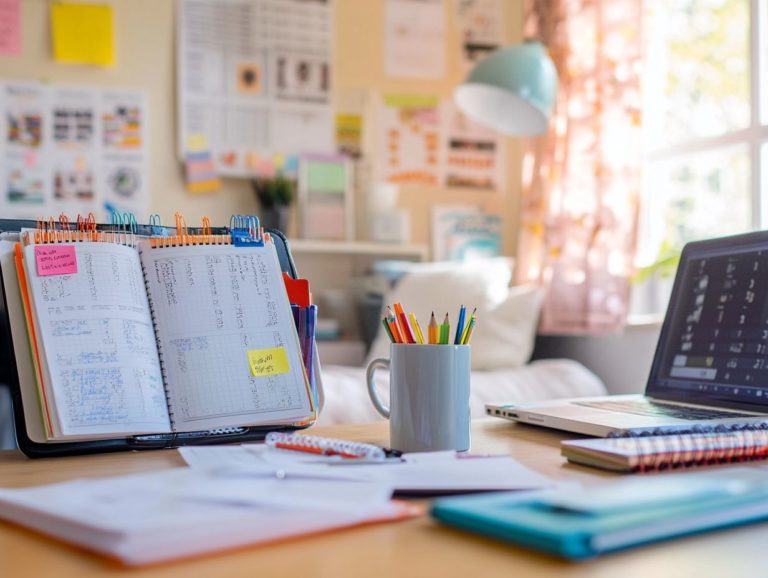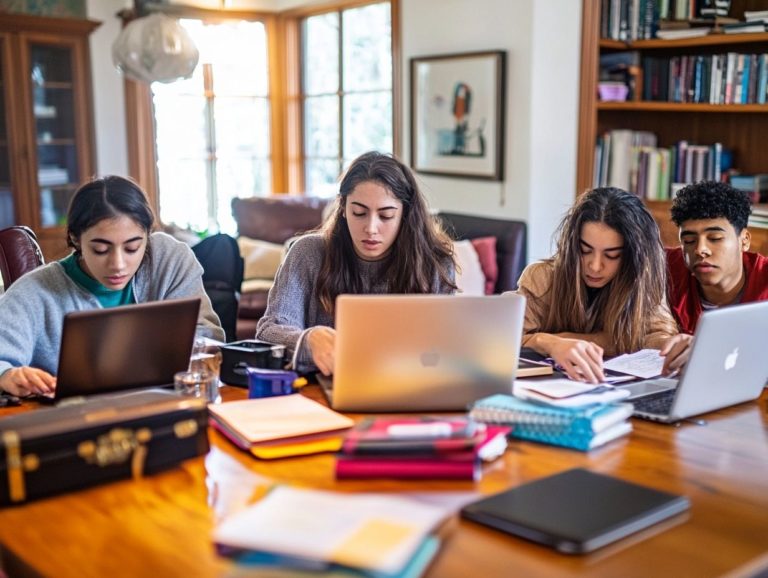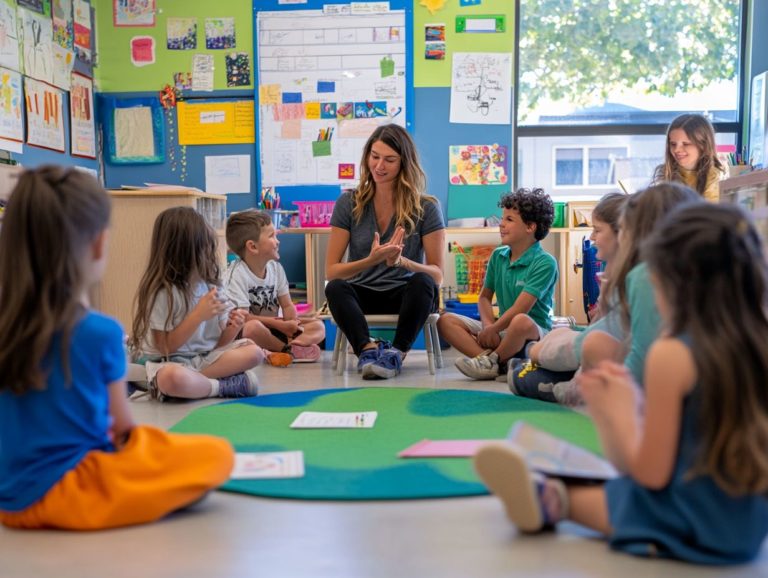5 techniques for retaining information longer
In today s fast-paced world, retaining information can often feel like an uphill battle. Whether you re a student, a professional, or simply someone eager to enhance your memory, effective strategies are essential for mastering new material.
Here are five powerful techniques crafted to help you retain information for the long haul. From leveraging visual aids to engaging in active recall, each method offers distinct advantages.
You ll explore how memory functions, the various types of memory, and practical tips for applying these techniques across different learning environments.
Prepare to elevate your memory retention skills, transforming the learning experience into something not only effective but genuinely enjoyable!
Contents
- Key Takeaways:
- 1. Harness the Power of Visual Aids
- 2. Practice Active Recall
- 3. Create Mental Associations
- 4. Use Spaced Repetition
- 5. Teach Someone Else the Information
- How Does Memory Work?
- Frequently Asked Questions
- What are the 5 techniques for retaining information longer?
- How does spaced practice help with retaining information longer?
- What is interleaving and how does it contribute to retaining information longer?
- Can elaboration really help with retaining information longer?
- How does retrieval practice aid in retaining information longer?
- Why is dual coding considered a useful technique for retaining information longer?
Key Takeaways:

- Use visual aids like diagrams, charts, or mind maps to supplement learning and enhance memory retention.
- Adopt active recall techniques such as quizzes or flashcards to engage with the material and better retain information for longer periods of time.
- Create mental associations like rhymes or acronyms to connect new information with existing knowledge, making it easier to remember.
1. Harness the Power of Visual Aids
Visual aids serve as powerful allies in your quest for knowledge. They significantly boost memory retention and transform complex information into something far more digestible.
This is especially true for visual learners, who thrive on processing information through images, graphs, and diagrams. This ultimately refines their study habits and enhances their overall learning techniques.
Various types of visual aids cater to your unique learning preferences. For instance:
- Infographics can condense vast amounts of information into engaging, easy-to-understand formats.
- Charts present data in a manner that clearly highlights relationships and trends.
- Diagrams, such as flowcharts and Venn diagrams, allow you to visualize processes and see connections between concepts.
Effective note-taking strategies, like the Cornell method, encourage organization and promote thorough review, thereby enhancing retention. Concept maps help you visually map out relationships between different ideas, significantly aiding in comprehension and long-term recall.
2. Practice Active Recall
Active recall is an effective learning technique that enhances your memory retention. It involves actively trying to remember information instead of just reading it.
This approach not only solidifies your knowledge but also aligns with the cognitive processes that dictate how you learn. Techniques like flashcards allow for swift retrieval, while self-quizzing encourages you to actively assess your comprehension.
Incorporating spaced repetition into your study routine ensures that you revisit information at optimal intervals. This effectively prevents forgetfulness and fosters deeper learning connections. By regularly engaging in these methods, you’ll unlock incredible personal growth; the act of retrieving and applying knowledge not only boosts your confidence but also cultivates a proactive attitude toward your education.
3. Create Mental Associations
Creating mental associations is a powerful strategy that enhances your memory retention by linking new information to what you already know.
By employing memory techniques like mnemonics, you can simplify complex concepts, making them easier to recall when studying or teaching others. These techniques can take various forms.
For instance, acronyms transform the first letters of a series of words into a memorable shortcut, while rhymes turn factual data into catchy verses, making them much easier to remember.
The cognitive processes involved in forming these associations are significant. They tap into your brain s natural inclination to seek out patterns, making learning feel more intuitive.
Visual imagery also plays a crucial role in this process. By pairing information with vivid pictures, you create deeper cognitive connections, ultimately leading to improved retention and a more effective overall learning experience.
Start implementing these techniques today and watch your memory retention soar!
4. Use Spaced Repetition

Spaced repetition is a standout learning technique that boosts your memory by reviewing material at increasing intervals. This method combats too much information and helps you remember better over time.
It uses your brain’s natural forgetting curve, making you revisit information just before you forget it. For students in challenging programs like nursing or college, this technique can greatly improve understanding and recall, even under stress.
Tools like Anki, Quizlet, and Memrise can help. They allow you to create flashcards and track your progress effectively.
Integrate these tools into your study routine to make significant strides in your academic performance and retention of crucial information!
5. Teach Someone Else the Information
Teaching others what you’ve learned is one of the best ways to improve memory retention. It reinforces your understanding and engages different types of learners.
By facilitating study groups or peer teaching, you encourage discussions, presentations, and even quizzes. This diversity enhances learning, making it more engaging and enjoyable.
When learners explain concepts in their own words, they can identify gaps in their understanding. This not only helps them but also benefits their peers.
How Does Memory Work?
Memory is an interesting process involving how we encode, store, and retrieve information. Understanding this can boost your learning skills significantly.
Encoding is where new information gets processed for storage. You might excel in this stage using visual aids or hands-on activities tailored to your learning style.
Storage maintains information in short-term and long-term memory. Retrieval helps you access that information when needed.
To handle too much information, focus on what’s essential. Break complex material into smaller parts and use active recall methods.
This approach creates a more manageable and enjoyable learning experience!
What Are the Different Types of Memory?
Memory has several forms: sensory memory, short-term memory, and long-term memory. Each plays a key role in how we remember things.
Sensory memory captures fleeting impressions, like the colors and sounds around you, but lasts only a moment. Short-term memory holds a limited amount of information, like a phone number, for about 20 to 30 seconds.
Long-term memory is where information is stored permanently, often linked to personal experiences. Different learning styles benefit from different types of memory.
For instance, visual learners quickly grasp images, while auditory learners strengthen memory by listening. Verbal learners benefit from recalling facts through writing or speaking.
This shows how memory types support various learning approaches, making your learning experience even better!
What Factors Affect Memory Retention?

Your memory retention depends on various factors. These include the complexity of the information, your emotional state, and the risk of information overload. Each of these elements interacts with cognitive processes mental activities involved in learning and memory either enhancing or hindering your personal growth and the development of your practice skills.
Understanding how your environment interacts with these variables is essential. For instance, a chaotic setting can amplify distractions, whereas a calm space promotes focused concentration. Emotional influences carry significant weight as well; positive feelings can enhance your engagement, boosting memory formation, while stress creates a cognitive load that obstructs learning.
To counteract these negative effects, consider strategies like:
- Breaking information into manageable chunks.
- Scheduling regular review sessions to bolster retention.
Incorporating mindfulness techniques can also help you manage your emotional states and reduce cognitive overload, paving the way for a more effective learning experience.
How Can One Improve Their Memory Retention?
Improving your memory retention involves employing effective learning techniques that can truly make a difference. Consider consistent testing through active recall, utilizing mnemonics for better recall, and developing practice skills that reinforce both understanding and long-term memory storage.
Incorporating spaced repetition into your study routine can significantly boost your ability to retain information over time. This method leverages the idea that spacing out your study time helps you remember better, allowing you to revisit material at strategically timed intervals, which helps cement knowledge in your mind.
Visualization is another powerful tool; it encourages your brain to create mental images, making information more vivid and easier to recall. Teaching others what you ve learned not only reinforces the material for yourself but also highlights any gaps in your understanding, leading to deeper insights.
Recognizing the physiological aspects, such as ensuring you get adequate rest and proper nutrition, is crucial. These factors play a significant role in optimizing brain function, thereby enhancing your entire learning process.
What Are the Benefits of Retaining Information Longer?
Retaining information for the long haul offers a wealth of benefits. You ll experience enhanced personal growth, develop more effective learning strategies, and gain the ability to teach others. This fosters deeper engagement and cements your knowledge acquisition.
In today s fiercely competitive academic landscape, those who excel in long-term retention often outshine their peers, showcasing an exceptional grasp and application of concepts. This mastery doesn t just help you ace exams; it paves the way for professional opportunities, where your knowledge becomes a highly sought-after asset.
When you confidently share what you’ve learned, you reinforce your own understanding while inspiring and engaging your colleagues. This creates a collaborative learning atmosphere that benefits everyone involved.
Organizations thrive when employees can clearly communicate complex ideas, leading to innovative solutions and well-considered choices that ultimately boost productivity and success.
How Can These Techniques Be Applied in Different Learning Settings?
Applying memory retention techniques in various learning environments, like study groups or classrooms, can significantly elevate your learning experience. This caters to the unique preferences of different learners, including visual and auditory types.
Take nursing schools, for example. Integrating mnemonic devices alongside hands-on simulations can deepen your understanding of complex medical procedures.
In college settings, collaborative learning approaches can also make a difference. When peer teaching happens, diverse learners get the chance to share valuable insights and strategies.
Tailoring your study materials using infographics for visual aids or audio recordings to enhance auditory retention can further support your varied learning preferences.
By embracing these adaptations, institutions not only facilitate better academic outcomes but also cultivate a more inclusive educational atmosphere where you and every other student can truly thrive.
Frequently Asked Questions

What are the 5 techniques for retaining information longer?
The five techniques for effective learning are spaced practice, interleaving, elaboration, retrieval practice, and dual coding. Let’s dive into each one, as these techniques help in information retention!
How does spaced practice help with retaining information longer?
Spaced practice means studying over time instead of cramming. This method helps your brain consolidate information and reduces forgetting.
What is interleaving and how does it contribute to retaining information longer?
Interleaving is mixing different subjects while studying. It sparks connections between concepts and strengthens your learning!
Can elaboration really help with retaining information longer?
Absolutely! Elaboration means explaining and expanding on what you study. It pushes your brain to process information deeply, making it easier to recall later.
How does retrieval practice aid in retaining information longer?
Retrieval practice focuses on recalling information from memory instead of just reviewing it. This approach strengthens your memory, making information easier to access in the future.
Why is dual coding considered a useful technique for retaining information longer?
Dual coding uses both visual and verbal ways to study. It creates multiple pathways for your brain to remember information, boosting retention!






